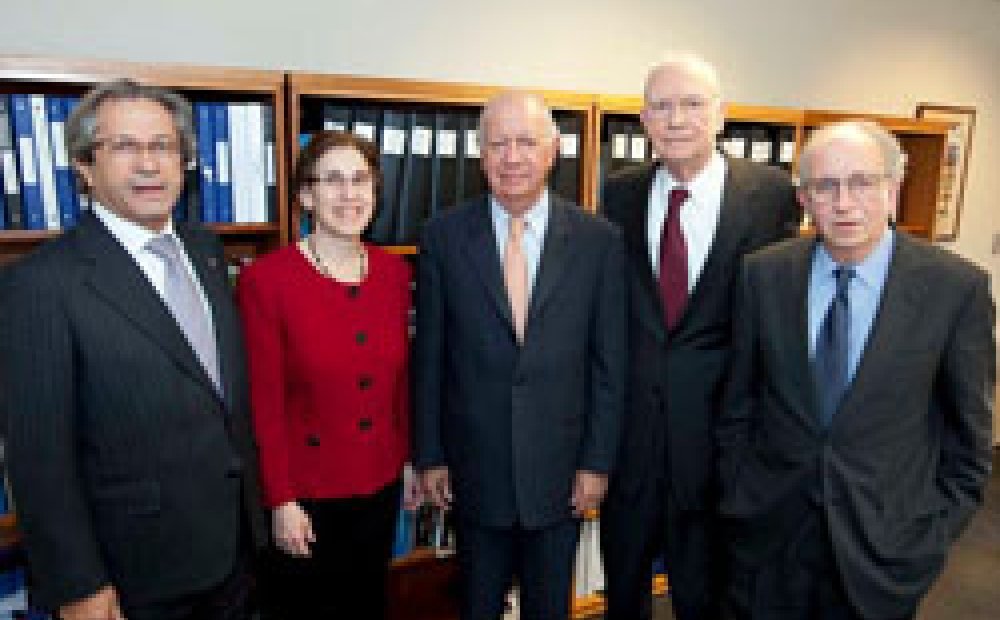Ricardo Lagos, Former President of Chile

The Latin American Program joined with the Inter-American Dialogue to sponsor an informal conversation with former President of Chile Ricardo Lagos on March 9. Lagos's comments focused on Latin American views of the United States and of Obama administration policy, and on the need for global cooperation and dialogue to solve issues such as climate change.
Key Issues
Security
Lagos argued that definitions of security were changing, and that drug trafficking and cartels, not the Iranian presence in Caracas, constituted the most serious threat for regional security. President Uribe's successes in combating drugs in Colombia created bigger problems for Mexico, which is closer to consumers in the U.S. market. The report issued by former presidents Fernando Henrique Cardoso of Brazil, Ernesto Zedillo of Mexico, and César Gaviria of Colombia said that the ‘war against drugs' is being lost. That said, however, countries of the region are far away from being able to discuss legalization of drugs. What is needed instead is a common approach to the problem.
World Trade
Developing countries gained a voice with the 2003 World Trade Organization (WTO) Fifth Ministerial Conference in Cancún, Mexico. Trade is important to all Latin American countries, Lagos affirmed, but the rules are in dispute. He questioned what position the United States would continue to take on such issues such as agricultural subsidies and antidumping, arguing that Latin America's position was much closer to that of Europe and far from that of the United States with respect to the latter issue.
A New Financial Architecture
Prior to the global financial crisis, most countries believed that the G-7 or 6-8 would be able to solve the world's economic problems. When the crisis erupted in late 2008, Latin America was not the cause even though it was affected. Lagos argued that, as a result of previous crises, Latin America's financial system is now stronger and better regulated than that of the United States. As a result, he said,
"The region wants to have a say in what financial institutions will emerge....We need a new Bretton Woods." Nonetheless, he said, it was unclear what position the United States would take with respect to reform of the institutions of global economic governance.
Migration
Lagos warned against considering migration as only a domestic U.S. problem; migration is also an issue within Latin America, where income disparities between countries are sometimes profound. "To perceive you are the only one with this problem is a mistake," he said, indicating that Latin American countries need to be part of the discussion about how to tackle complex immigration issues.
Climate Change
Arguing that "climate change is here to stay as a major global problem," Lagos underlined the importance of global negotiations, not just market forces, to reduce carbon emissions.
Lagos stated that two major positions emerged from the 15th Conference of the Parties to the United Nations Framework Convention on Climate Change (UNFCCC) held in Copenhagen in December 2009. European countries pledged to reduce 1990 level emissions by 20 percent by 2020, while the United States pledged to reduce 2005 level emissions by17 percent.
"The big question is, what about developing countries?" he asked. Latin America is not a homogeneous region and countries are rapidly achieving middle income status. Emerging countries such as China and India must also be taken into account.
Latin American Perceptions of the United States and the Obama Administration
Lagos argued that one of President Obama's most difficult challenges was to manage expectations. People thought that too many things would change in Obama's first year in office, and expectations were particularly high after George W. Bush left office. The change from the unilateralism of the Bush administration to the multilateralism of the Obama administration was huge, he argued. Nonetheless, Obama's domestic and foreign policy agendas are so huge that Latin America as a region senses that there is "not much time for us."
He posited that although President Obama is "extremely popular in the region," there is skepticism regarding his ability to deliver on his packed agenda. Partisanship in the U.S. Congress has complicated efforts to pass domestic legislation, and there is concern that this polarization could affect issues regarding Latin America. Lagos cautioned that security was clearly high on the U.S. agenda, pointing to President Obama's and Secretary of State Hillary Clinton's visits to Mexico, but other issues of trade, reform of international financial institutions, and climate change are lower priorities. Latin America needs to have a more mature relationship with the United States, and in the last decade, Latin America has been changing very fast. Most countries are middle income countries and do not qualify for foreign assistance. The big change, Lagos argued, is that most countries in the region recognize the United States as the dominant military, economic, and political power in the world, but also know that the United States cannot solve its problems alone. "If you have this equation," he said, "then dialogue is essential."
Hosted By

Latin America Program
The Wilson Center’s prestigious Latin America Program provides non-partisan expertise to a broad community of decision makers in the United States and Latin America on critical policy issues facing the Hemisphere. The Program provides insightful and actionable research for policymakers, private sector leaders, journalists, and public intellectuals in the United States and Latin America. To bridge the gap between scholarship and policy action, it fosters new inquiry, sponsors high-level public and private meetings among multiple stakeholders, and explores policy options to improve outcomes for citizens throughout the Americas. Drawing on the Wilson Center’s strength as the nation’s key non-partisan policy forum, the Program serves as a trusted source of analysis and a vital point of contact between the worlds of scholarship and action. Read more
